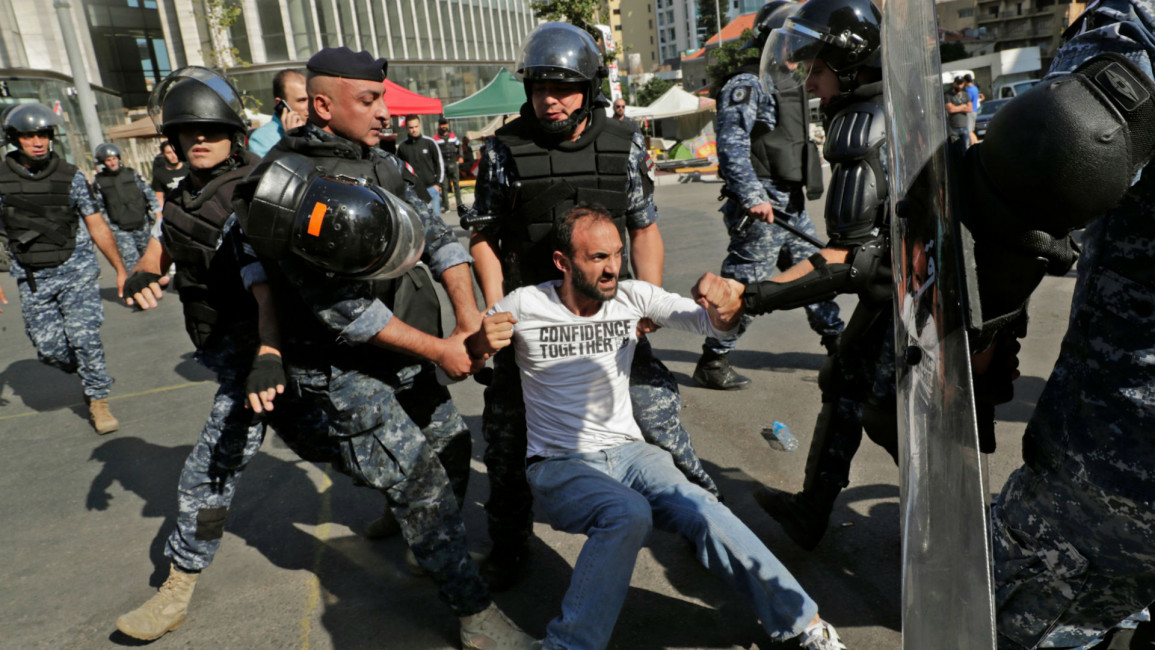'We won't give up': Lebanon struggles to reopen roads as anti-corruption protesters fight on
Lebanese protesters faced off with security forces on Thursday as they tried to block reopened roads and prevent their unprecedented non-sectarian push for radical reform from petering out.
The resignation of Prime Minister Saad Hariri's government on Tuesday had been met with cheers from the crowds seeking the removal of a political class seen as corrupt, incompetent and sectarian.
The fall of the government under pressure from the street had led to an easing of the lockdown that has crippled the country of six million inhabitants.
While some life returned to the streets of Beirut and other cities this week, die-hard protesters were reluctant to lose one of the few forms of leverage they have to press demands that go far beyond the cabinet's resignation.
"Giving up is out of the question," said Tarek Badoun, 38, one of a group of demonstrators blocking the main flyover in central Beirut.
 |
The mass mobilisation, which has seen hundreds of thousands protest nationwide, has so far been largely bloodless, despite sporadic scuffles with counter-demonstrators from the established political parties |  |
The tug-of-war between demonstrators seeking to block roads and security forces under orders to reopen the country for business repeated itself on Thursday.
Lebanese troops and riot police later reopened a major highway north of Beirut and a bridge in the capital that had been blocked by demonstrators.
The mass mobilisation, which has seen hundreds of thousands protest nationwide, has so far been largely bloodless, despite sporadic scuffles with counter-demonstrators from the established political parties.
Some schools have reopened this week and banks were due to reopen on Friday, as the protests piled more economic pressure on a country that has been sliding towards default in recent months.
Twitter Post
|
Technocrats
"The political class is banking on the protests running out of steam, that much is clear," said Karim Bitar, a professor of international relations in Paris and Beirut.
"It hopes the Lebanese, choked by economic hardship, will resume their daily lives," he said.
President Michel Aoun has asked Hariri's government to stay on in a caretaker capacity until a new one can be formed but Lebanon has entered a phase of acute political uncertainty, even by its own dysfunctional standards.
With a power-sharing system organised along communal and sectarian lines, the allocation of ministerial posts can typically take months, a delay Lebanon's donors say the debt-ridden country can ill afford.
French Foreign Minister Jean-Yves Le Drian said it was "essential for Lebanon's future that a new government be formed rapidly to carry out the reforms that the country needs".
The new government would need to "address the legitimate aspirations expressed by Lebanese and take the decisions indispensable to the country's economic recovery," he said.
France is a major donor and retains significant influence in its former colony.
According to press reports, consultations for the formation of a new government are barely under way, such is the rift between Hariri and his coalition rivals.
Among the possible scenarios is one which would see Hariri return at the helm of revamped line-up that includes technocrats, one of the demands of the protesters.
"A technocratic government is a possibility," political analyst Amal Saad-Ghorayeb said.
"It would have to ensure a short-term stabilisation of the economy which has spiralled out of control these past weeks, while ensuring economic reforms pass quickly otherwise mass protests will erupt once again," she said.
The Hezbollah movement headed by Hassan Nasrallah was a key player in the outgoing government and had warned repeatedly against the chaos a government resignation could cause.
The Shia movement is allied to the Christian movement of President Michel Aoun, who had also counselled against a mass resignation.
He is thought to be insisting on keeping his son-in-law Gebran Bassil, who is Lebanon's foreign minister and one of the most reviled figures among protesters, in government.
Aoun, who was elected president exactly three years ago, was expected to give a speech later Thursday.
Follow us on Twitter: @The_NewArab

![Members of the Algerian delegation threw roses into the Seine [Getty]](/sites/default/files/styles/image_330x185/public/2024-07/GettyImages-2162980872.jpg?h=199d8c1f&itok=h_3o_TOL)

![The Libyans were arrested at a farm in Mpumalanga province east of Johannesburg [Getty]](/sites/default/files/styles/image_330x185/public/2024-07/GettyImages-2162903568.jpg?h=199d8c1f&itok=4Qzg79i1)